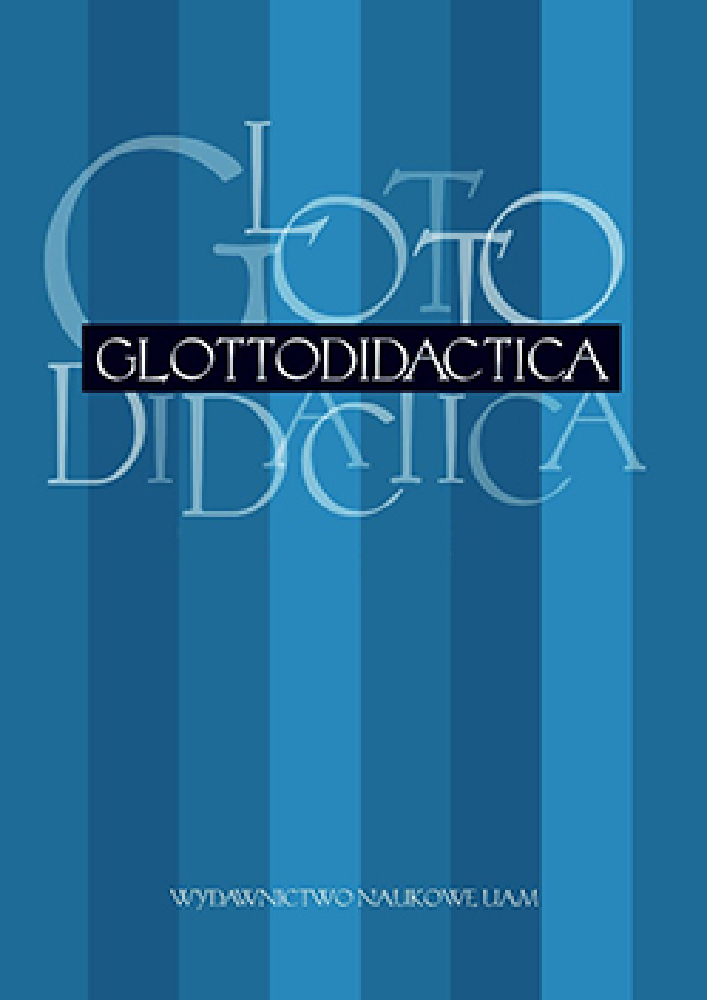Abstract
The main goal of this article is to discuss the position of Polish language in the European Union, especially in the German-Polish border region. The role of language policy in the process of multilingualism will also be presented.Literaturhinweise
Ammon, U., 2004. Funktionale Typen und Statustypen von Sprachsystemen. In: Ammon, U./Dittmar N./Mattheier, K./Trudgill, P. (Hrsg.), Sociolinguistics: an international Handbook o f the Science o f Language and Society=Soziolinguistik: Ein internationales Handbuch zur Wissenschaft von Sprache und Gesellschaft. Vol. 1. Berlin und New York: Walter de Gruyter, 184-195.
Bochmann, K., 1993. (Hrsg.), Sprachpolitik in der Romania: Zur Geschichte sprachpolitischen Denkens und Handelns von der Französichen Revolution bis zur Gegenwart. Berlin und New York: Walter de Gruyter.
Bußmanns Lexikon der Sprachwissenschaft 1990 und 2002. Stuttgart: Kröner.
Crystal, D., 1997. English as a Global Language. Cambridge: Cambridge University Press.
Franchenscini, R., 2006. Mehrsprachigkeit: das Lernpotential von Grenzregionen. In: Abel, A./Stuflesser, M./Putz, M. (Hrsg.), Mehrsprachigkeit in Europa: Erfahrungen, Bedürfnisse, Gute Praxis.24-26.08.2006 Bozen. Bozen: Europäische Akademie Bozen, 33-41.
Gajda, S., 1998. Promocja języka i kultury polskiej a procesy uniwersalizacji i nacjonalizacji kulturowo-językowej w świecie. In: Mazur, J. (Hrsg.), Promocja języka i kultury polskiej w śmiecie. Lublin: Wydawnictwo Uniwersytetu Marii Curie-Skłodowskiej, 11-18.
Gemeinsamer Europäischer Referenzrahmen für Sprachen: lernen, lehren, beurteilen. 2001. Berlin u.a.: Langenscheidt.
Handt, G., 2002. Lernende, Lehrende und Institutionen. In: Quetz, ]./von der Handt, G. (Hrsg.), Neue Sprachen lehren und lernen. Fremdsprachenunterricht in der Weiterbildung. Bielefeld: W. Bertelsmann Verlag, 9-29.
Kubiak, P., 2002. Języki światowe. In: Języki Obce w Szkole 3, 4-7.
Metzler Lexikon Sprache. 1993. Stuttgart: J.B. Metzler.
Nöth, D., 2001. Interkulturelles Lernen und Nachbarspracherwerb im Projekt Spotkanie heißt Begegnung. Hohengehren: Schneider Verlag.
Pfeiffer, W., 2004. Aktualne zagadnienia i wyzwania dla polskiej polityki językowej. In: Bartoszewicz, I./Hałub, M./Jurasz, A. (Hrsg.), Werte und Wertungen. Sprach-, literatur- und kulturwissenschaftliche Skizzen und Stellungnahmen. Festschrift fü r Eugeniusz Tomiczek. Wroclaw: Oficyna Wydawnicza ATUT Wrocławskie Wydawnictwo Oświatowe, 188-193.
Pisarek, W., 1999. Istota i sens polskiej polityki językowej. In: Mazur, J. (Hrsg.), Polska polityka językowa na przełomie tysiącleci. Lublin: Wydawnictwo Uniwersytetu Marii Curie-Skłodowskiej, 13-23.
Putzer, O., 2006. Staat-Nation-Sprache. In:. (Hrsg.): Abel, A./Stuflesser, M./Putz, M. (Hrsg.), Mehrsprachigkeit in Europa: Erfahrungen, Bedürfnisse, Gute Praxis.24-26.08.2006 Bozen. Bozen: Europäische Akademie Bozen, 49-62.
Stark, F., 1996. Stationen deutscher Sprachenpolitik. In: Materialien zum Internationalen Kulturaustausch 26. Stuttgart: IFA, 27-38.
Walczak, B., 2001. Język polski na Zachodzie. In: Bartmiński, J. (Hrsg.), Współczesny język polski. Lublin: Wydawnictwo Uniwersytetu Marii Curie-Skłodowskiej, 563-574.
Witt, J., 2001. Wohin steuern die Sprachen Europas? Probleme der EU-Sprachpolitik. Tübingen: Stauffenburg Verlag (ZAA Studies, 13).
Wojciechowski, K., 2002. Der deutsch-polnische Grenzraum als Brücke nach Osten. Die Rolle des Deutschen und des Polnischen entlang der Oder und Ihre Bedeutung für eine neue europäische Kultur. In: Oppermann, D. (Hrsg.), Sprachen und Grenzräume. Partnersprachen und interkulturelle Kommunikation in europäischen Grenzräumen. St. Ingbert: Röhrig Universitätsverlag, 81-96.
Lizenz
Authors
Authors of texts accepted for publication in Glottodidactica are required to complete, sign and return to the editor's office the Agreement for granting a royalty-free license to works with a commitment to grant a CC sub-license.
Under the agreement, the authors of texts published in Glottodidactica grant the Adam Mickiewicz University in Poznań a non-exclusive, royalty-free license and authorize the use of Attribution-NoDerivatives 4.0 International (CC BY-ND 4.0) Creative Commons sub-license.
The authors retain the right to continue the free disposal of the work.
Users
Interested Internet users are entitled to use works published in Glottodidactica since 2016, under the following conditions:
- attribution - obligation to provide, together with the distributed work, information about the authorship, title, source (link to the original work, DOI) and the license itself.
- no derivatives - the work must be preserved in its original form, without the author's consent it is not possible to distribute the modified work, such as translations, publications, etc.
Copyrights are reserved for all texts published before 2016.
Miscellaneous
Adam Mickiewicz University in Poznań retains the right to magazines as a whole (layout, graphic form, title, cover design, logo etc.).




